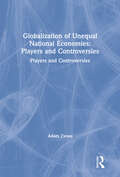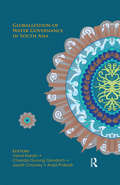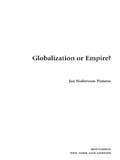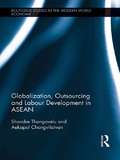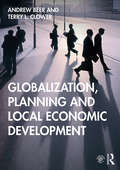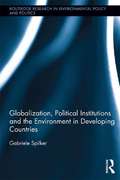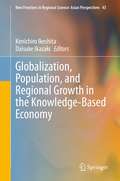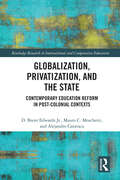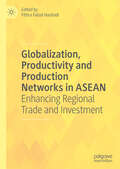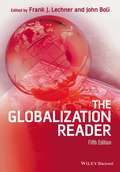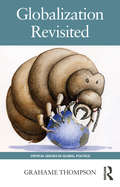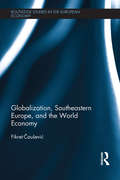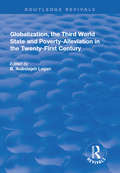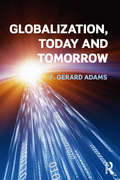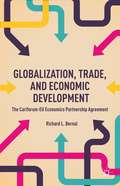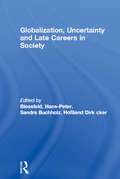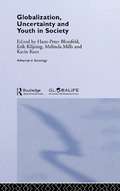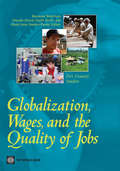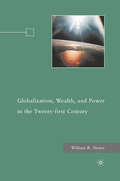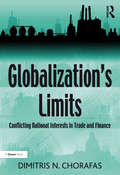- Table View
- List View
The Globalization of the NFL
by Juan Alcacer Mary FureyBy 2010, the National Football League (NFL) was still having trouble attracting both a global roster and fan base despite systemized attempts at internationalizing since 1989. Why? Was it simply a bad idea to try to export football, a sport that many considered uniquely American? Or was it a good idea that had been poorly executed?
Globalization of Unequal National Economies: Players and Controversies
by Adam ZwassAs the Seattle protests over the formation of the WTO showed all too clearly, there is a strong need for in-depth understanding of how the globalization of the world economy is affecting the economic, political, and social development of the individual nation-states. This book provides a detailed and authoritative examination of the on-going issues related to globalization, such as the increasingly unfair distribution of the world's resources, and how this phenomenon is involving wildly disparate countries. While the main focus of the book is the United States, with its flexible markers, wide social differences, and its breath-taking level of economic expansion, extensive attention is also given to the other major players, including the European Union and those central and eastern European nations who very much want to become member countries, as well as China, India, Japan, Russia, and Southeast Asia.
Globalization of Water Governance in South Asia
by Vishal Narain Chanda Gurung Goodrich Jayati Chourey Anjal PrakashGlobalization has significantly redefined the nature of governance in the water sector. Non-state actors—multilateral and transnational donor agencies and corporations, non-government organizations, markets, and civil society at large—are assuming a bigger role in public policy-making for water resource management. New discourses on neoliberalism, integrated water resource management (IWRM), public–private partnerships, privatization, and gender equity have come to influence water governance. Drawing upon detailed case studies from India, Bangladesh, Nepal, Sri Lanka, and Bhutan, this volume shows the implications of these new global paradigms for water allocation and management practices, institutions and governance structures in South Asia. It suggests that, despite claims to the contrary, they have done little to further human well-being, reduce gender disparity, or improve accountability and transparency in the system. Steering away from blueprint approaches, it argues for a more nuanced and contextual understanding of water management challenges, based on local knowledge and initiatives. This book will be useful to those interested in political economy and water governance, natural resource management, environmental studies, development studies, and public administration, as well as to water professionals, policy-makers and civil society activists.
Globalization or Empire?
by Jan Nederveen PieterseIn this smart and concise examination of the trends driving contemporary globalization, Jan Nederveen Pieterse argues that the United States' pursuit of global primacy is based upon a complex melding of neoliberal economics and hegemonic politics. Do alternate capitalisms offer viable alternatives to the American way? Globalization or Empire? looks at globalization with acuity and thoughtfulness and uncovers its underlying dramas.
Globalization, Outsourcing and Labour Development in ASEAN (Routledge Studies in the Modern World Economy #115)
by Aekapol Chongvilaivan Shandre ThangaveluDue to technical advances in production and communication technology, outsourcing – contracting out production of intermediate materials and services – has affected the economic growth of the ASEAN region. This new book fills an important gap in the literature looking at the impact outsourcing has on labour markets, its subtle effects on regional economies and policy implications. Shandre Thangavelu and Aekapol Chongvilaivan investigate various impacts of outsourcing on labour markets, such as its effects on labour productivity, skill upgrading, human capital, and training, in ASEAN economies with a focus on the experience of the two ASEAN countries as a global hub of outsourcing: Singapore and Thailand. This book approaches these research inquiries by developing several econometric models, including primal production functions and dual cost functions, among others. The empirical evidence this book reveals provides interesting insights into and implications on labour and industry development.
Globalization Past, 1850-1914 (A)
by Federica Gabrieli Sophus A ReinertOn the evening of 3 August 1914, British Foreign Secretary Lord Edward Grey contemplated whether to advice King and Parliament to declare war on Germany in the wake of the country's invasion of Belgium, or to stay out of what quickly was becoming a world war triggered by a royal assassination in Sarajevo. Over the past century, the said world had become woven together in ways never before seen, and a truly global economy had emerged that many believed forever would banished the possibility of war altogether. But could trade really assure perpetual peace, and what ultimately mattered most; interest, or principles? The case considers the lessons to be had from the rise and fall of the last great period of globalization.
Globalization Past, 1850-1914 (A)
by Federica Gabrieli Sophus A. ReinertOn the evening of 3 August 1914, British Foreign Secretary Lord Edward Grey contemplated whether to advice King and Parliament to declare war on Germany in the wake of the country's invasion of Belgium, or to stay out of what quickly was becoming a world war triggered by a royal assassination in Sarajevo. Over the past century, the said world had become woven together in ways never before seen, and a truly global economy had emerged that many believed forever would banished the possibility of war altogether. But could trade really assure perpetual peace, and what ultimately mattered most; interest, or principles? The case considers the lessons to be had from the rise and fall of the last great period of globalization.
Globalization, Planning and Local Economic Development
by Andrew Beer Terry L. ClowerThis textbook looks at economic development at the local, community or regional scale. It provides students with a comprehensive introduction to contemporary thinking about locally-based economic development, how growth can be planned and how that development can be realized. Globalization, Planning and Local Economic Development:• Provides students with a thorough understanding of current debates around local and regional development and how that body of work can assist them in helping communities grow;• Equips students with a ‘toolkit’ of strategies that enable them to both plan for development and deliver that development through their professional lives; • Offers a roadmap for economic development that helps students make sense of place-based development by providing a ‘meta narrative’ of how regions grow and how those processes can be enhanced. This integrating perspective will be organized around the concept of competitiveness and how that concept can be understood and operationalized in various ways; • Introduces students to a range of techniques essential to success in economic development planning. In addition to a wealth of case studies and pedagogical features in the book, this text is also complemented by online resources. In offering a full toolkit of economic development knowledge, techniques and strategies, this text will thoroughly prepare students for a career in urban planning, transport planning, human geography, applied economic analysis, geographic information systems, or work as an economic development practitioner.
Globalization, Police Reform and Development
by Graham Ellison Nathan W. PinoThis volume presents a unique examination of Western-led police reform efforts by theoretically linking neoliberal globalization, police reform and development. The authors present seven country case studies based on this theoretical and conceptual approach and assess the prospects for successful police reform in a global context.
Globalization, Political Institutions and the Environment in Developing Countries (Routledge Research in Environmental Policy and Politics)
by Gabriele SpilkerThough industrialized countries are usually the ones indicted when environmental pollution is discussed, over the few last years the rate of emissions in developing countries has increased by a startling amount. The fallout from this increase is evidenced by the struggle of cities like Beijing to improve their air quality. Yet there also exist developing countries such as Thailand that have managed to limit their emissions to more tolerable levels, raising the question: why are some developing countries more willing or able to take care of their environment than others? In this volume, Gabriele Spilker proposes two factors for the differences in developing countries’ environmental performance: integration into the international system and domestic political institutions. Focusing on developing countries generally but also closely examining important global powers such as China and India, Spilker employs a rigorous quantitative analysis to demonstrate the importance of considering various aspects of the international system, in order to draw more comprehensive conclusions about how globalization affects environmental performance. She asserts that democratic political institutions can shield developing countries from the negative consequences of either trade or foreign direct investment. But at the same time, developing countries, by avoiding demanding commitments, are more likely to use environmental treaties as a cover than as a real plan of action. Adding a new dimension to the existing body of research on environmental quality and commitment, Spilker convincingly demonstrates how international and domestic political factors interact to shape developing countries’ ability and willingness to care for their natural environment.
Globalization, Population, and Regional Growth in the Knowledge-Based Economy (New Frontiers in Regional Science: Asian Perspectives #43)
by Kenichiro Ikeshita Daisuke IkazakiThis book clarifies how globalization, progress in the knowledge-based economy, and demographic change affect regional economic growth, using the latest analytical methods for economic growth. In the last 30 years, Asian countries have realized remarkable economic growth and are expected to become major growth centers of the world economy in the future. On the other hand, many researchers and policy makers point out that the Asian economy will face numerous challenges to sustain its growth. Specifically, globalization, realization of the knowledge-based economy, and population decline will bring about major changes in the structure of the Asian economy. This book provides the reader with the analytical framework to investigate how these structural changes affect regional economic growth. Moreover, the book covers topics such as foreign direct investment, quality of institutions, intergenerational conflict, education policies, and household fertility decision, all of which are comprehensively explained from the point of view of economic growth. Therefore, the scope of this volume is not only contemporary but also important for going beyond the usual regional economics and growth literature. This work is highly recommended to academic researchers and students who are interested in various aspects of regional economic growth.
Globalization, Privatization, and the State: Contemporary Education Reform in Post-Colonial Contexts (Routledge Research in International and Comparative Education)
by D. Brent Edwards Jr. Mauro C. Moschetti Alejandro CaravacaThis text explores how the dynamics of globalization and privatization have influenced state policy and impacted education reform in Honduras. Chapters document historical trends and the evolution of Honduras as a post-colonial nation, before looking in detail at recent state interventions in policy at pre-school, elementary, and secondary level. By offering empirical analysis of the Honduran education sector, the changing role and priorities of the state, and the increasing involvement of international organizations, NGOs, and private actors in the provision of education, the text increases understanding of how state theory interacts with broader global dynamics to impact education. This text will benefit researchers, academics, and educators with a focus on international and comparative education, policy analysis, globalization, and international development.
Globalization, Productivity and Production Networks in ASEAN: Enhancing Regional Trade and Investment
by Fithra Faisal HastiadiThis book examines the challenges that ASEAN (Association of Southeast Asian Nations) members need to overcome in order to sustain and intensify economic growth. The ASEAN market is widely regarded as a new hub of growth, not least in light of increasing protectionism and declining economic growth of the three largest countries in Northeast Asia (China, Japan, and South Korea). Contributors address a range of issues with a concentrated focus on evidence from Indonesia, including globalisation, increasing populism, trade, FDI, the benefits of the production network, and related issues such as spill-over, crises, innovation and technology, and selected sectoral commodity and policy analysis of Indonesia. This book analyses and explains the relationship between trade and foreign direct investment, and technical changes, with regard to improving ‘productivity’ in the supply-side economic growth model using, in particular, Indonesia as the de facto leader of ASEAN. This book will be of interest to academics and students specialising in international economics and international development.
The Globalization Reader, Fifth Edition
by Frank J. Lechner John BoliCompletely revised and updated, the fifth edition of this well-regarded textbook charts key topics and recent research in globalization along with the latest complexities and controversies in the field.
Globalization Revisited (Critical Issues in Global Politics)
by Grahame ThompsonWritten by one of the leading scholars of global politics, Globalization Revisited is a major new book for students of globalization. It describes and explains the challenges to liberalism and the global order as result of globalizing forces - from financial interconnectedness to the growth of religious fundamentalisms. The text: provides a detailed analysis of the economic and financial aspects of globalization; examines the changes to global power and governance created by globalization including its effect on the sovereignty of the nation state; discusses recent trends such as the increased use of networks and social media; assesses the rise of globalizing fundamentalism; analyzes the challenges to globalization posed by contemporary events such as the global financial crisis. This book will be essential reading for all students of globalization, and will be of great interest to students of global politics and global governance.
Globalization, Robots, and the Future of Work
by Jeffrey A. Joerres Amy BernsteinWhen Jeffrey Joerres first joined Manpower, in 1993, the labor market was relatively stable and the company still focused largely on traditional office, clerical, and industrial staffing. But since then globalization and rapid advances in technology have dramatically reshaped the employment landscape. During his 15 years as CEO, Joerres expanded the company's international operations and moved into the increasingly competitive market for IT, finance, and engineering professionals. In this interview with HBR's editor, he describes how micromarket analysis reveals "geolocated pools of skills" that businesses can tap--until competitors muscle in, deplete the skills pool, and drive up wages. So companies must acquire a "nomadic mentality" that will allow them to establish more-temporary, smaller operations as well as large ones. He acknowledges that "when full-scale robotics and artificial intelligence arrive in a broad-based, affordable, easily justifiable way," hordes of workers will be displaced, with little or no preparation for very different jobs. Joerres advises companies that want to develop a workforce strategy to put multiple work models in place--crowdsourcing, distant manufacturing, temporary contractors moving to full-time--and truly practice them. "When are we done with this efficiency thing?" he says. "The answer is never."
Globalization, Southeastern Europe, and the World Economy (Routledge Studies in the European Economy)
by Fikret CausevicThis book explores the key economic issues facing Southeastern Europe and Bosnia and Herzegovina, within the context of the serious challenges that the global economy has faced in recent years. The book combines rigorous analysis of the issues faced by the region with a constructive approach to identifying solutions for a positive future trajectory. The book starts by exploring the economic challenges facing the world economy both before and during the global economic crisis. The second part of the volume focuses on south-eastern Europe, and especially on the Western Balkans, assessing the best ways of achieving a positive economic future for small open economies in the region. The final part of the volume examines the economic challenges in Bosnia and Herzegovina. The final section examines the economic challenges in Bosnia and Herzegovina, arguing that it is most useful to view the country within the context of the regional and global economies. The book will be extremely useful for scholars working on European Economics, transition economics, and the global economy and the financial crisis.
Globalization, the Third World State and Poverty-Alleviation in the Twenty-First Century (Routledge Revivals)
by B. Ikubolajeh LoganThis title was first published in 2002.Bringing together an inspiring mix of US and African contributors, this book explores the dynamics of the unfolding globalized economic, political, socio-cultural and environmental systems. Featuring incisive international commentary on the causes and consequences of poverty in the Third World it presents a powerful study of the strategies by which Third World governments and civil society can overcome poverty by insinuating themselves more creatively into the global order. The result is one of the defining works so far produced on the tensions between globalization and development.
Globalization; Today and Tomorrow
by Gerard F AdamsThis book seeks to examine the basis of economic globalization, yesterday, today, and tomorrow, and to link the outcome of globalization into the context of the new economic geography. It shows how the phenomenon is exhibited in the light of current events, providing a good way to keep understand today’s world economy.
Globalization , Trade , And Economic Development
by Richard L. BernalThis is the most in-depth study of the economic partnership between the European Union and the CARIFORUM countries, a group of fifteen small developing economies in the Caribbean. The CARIFORUM-EU Economic Partnership Agreement (EPA) is the first trade agreement of its kind, as it is a new type of WTO-compatible trade agreement between a group of developed countries and a group of developing countries. As a principal negotiator for CARIFORUM, Bernal's qualifications allow him to provide a unique perspective on the increasingly important topic of trade and economic development in the midst of globalization. Globalization, Trade, and Economic Development comprehensively explores the components of the EPA from all angles, explains how the agreement provides opportunities to strengthen and accelerate economic development, and outlines the policies which can allow the CARIFORUM countries to seize these opportunities. Bernal's explanation of the institutional arrangements for the conduct of the negotiations by CARIFORUM is invaluable to governments and regional organizations in developing countries for coordinating groups to advance common and joint positions in international negotiations.
Globalization, Uncertainty and Late Careers in Society (Routledge Advances in Sociology)
by Dirk Hofäcker Hans-Peter Blossfeld Sandra BuchholzGlobalization has been strongly shaping and transforming both national economies and individual careers in recent decades. These profound changes have had significant consequences for individual careers of men and women both during and after their employment career. This impressive new collection focuses on the effects of the globalization process on late-midlife workers and the exit from employment – a relationship that has up to now mostly been neglected in social science literature on aging and employment. The research documented within these pages poses several important questions: * Has globalization produced fundamental shifts in late-midlife workers’ labor market participation and late careers? * What transformations in old age career mobility can we observe? * How are these transformations filtered by different national institutional settings? With an impressive array of contributions, this volume will interest students and academics involved in the study of sociology, welfare and globalization.
Globalization, Uncertainty and Youth in Society: The Losers in a Globalizing World (Routledge Advances in Sociology)
by Melinda Mills Hans-Peter Blossfeld Erik Klijzing Karin KurzExamining how youths in fourteen industrialized societies make the transition to adulthood in an era of globalization and rising uncertainty, this collection of essays investigates the impact that institutions working with social groups of youths have upon those youths' abilities to make adult decisions determining their life courses. Covering both Europe and North America, the book includes case studies, and contains country-specific contributions on conservative, social-democratic, post-socialist, liberal and familistic welfare regimes, as well as data from the GLOBALIFE project. Filling the gap in the market on the micro effects of globalization on individuals, and taking an empirical approach to the topic, this impressive volume brings the individual and nation-specific institutions back into the discussion on globalization.
Globalization, Wages, and the Quality of Jobs
by Drusilla Brown Raymond Robertson Gaëlle Le Borgne Pierre Maria Laura Sanchez-PuertaSince the early 1990s, most developing economies have become more integrated with the world's economy. Trade and foreign investment barriers have been progressively lifted and international trade agreements signed. These reforms have led to important changes in the structures of these economies. The labor markets have adjusted to these major changes, and workers were required to adapt to them in one way or another. In 2006, the Social Protection Unit of the World Bank launched an important research program to understand the impact that these profound structural changes have had on workers in developing countries. 'Globalization, Wages, and the Quality of Jobs: Five Country Studies' presents the findings and insights of this important research program. In particular, the authors present the similar experiences of low-income countries with globalization and suggest that low-income countries' working conditions have improved in the sectors exposed to globalization. However, 'Globalization, Wages, and the Quality of Jobs' also highlights concerns about the sustainability of these improvements and that the positive demonstration effects on the rest of the economy are unclear. The empirical literature that exists, although vast, does not lead to a consensus view on globalization's eventual impact on labor markets. Understanding the effects of globalization is crucial for governments concerned about employment, working conditions, and ultimately, poverty reduction. Beyond job creation, improving the quality of those jobs is an essential condition for achieving poverty reduction. 'Globalization, Wages, and the Quality of Jobs' adds to the existing literature in two ways. First, the authors provide a comprehensive literature review on the current wisdom on globalization and present a micro-based framework for analyzing globalization and working conditions in developing countries. Second, the authors apply this framework to five developing countries: Cambodia, El Salvador, Honduras, Indonesia, and Madagascar. This volume will be of interest to government policy makers, trade officials, and others working to expand the benefits of globalization to developing countries.
Globalization, Wealth, and Power in the Twenty-first Century
by William R. NesterThis book offers an in-depth exploration of all dimensions of geoeconomics, including the internal and international forces which explain why most countries remain mired in poverty; the conflicts between the poor on the rich countries; and the global environmental crises threatening the future of humanity.
Globalization's Limits: Conflicting National Interests in Trade and Finance
by Dimitris N. ChorafasSo far there has been only praise for globalization. However, the export wave of China’s manufacturing machine and, more recently, the Global financial crisis show that globalization has limits. Globalization, the internationalization of trade, and financial integration are having enormous implications for businesses as well as for the whole economies of countries or blocks of countries. In this book Dr Chorafas argues that research is now producing evidence that there are limits to such globalization and amalgamation and that these need to be better defined and understood if some of the problems now being identified are to be prevented from applying the brakes, or worse, putting the process into reverse gear. The author examines the impact on countries such as the United States and European Union of occurrences like China's emergence as a massive manufacturing platform and the distortions of trade that result, affecting countries' GDP and creating problems such as uncontrollable current account deficits. He also considers the effect of Sovereign Wealth Funds as new entrants on the scene. These, he argues, are seen by some as 'the Trojan horses of state capitalism', particularly in what he defines as the 'absence of a global sheriff'. Globalization’s Limits looks at the EU and the Euroland as a test of globalization. The conclusions Chorafas draws about the effect on member states of pan-European banking, and the Euro as common currency, have implications for Britain and for the rest of the world. Issues relating to missed opportunities and leadership beg questions such as 'Who, if anybody, is or should be in charge of global monetary policy?

